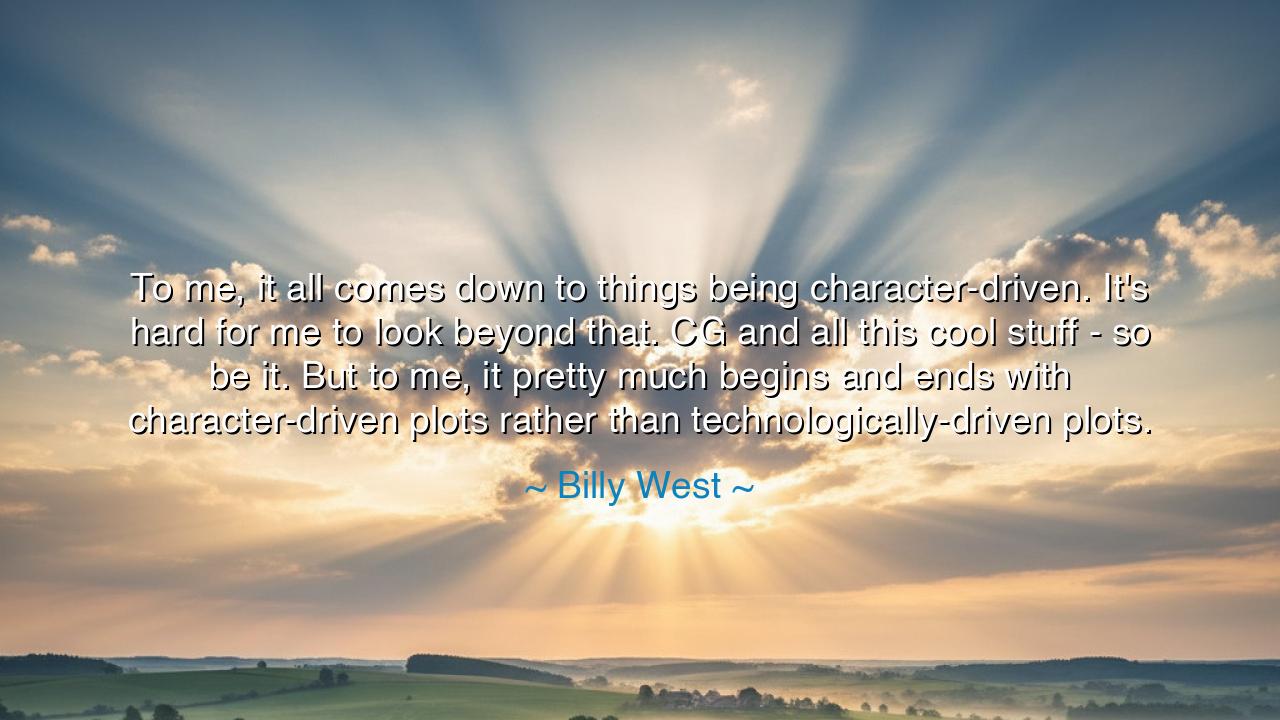
To me, it all comes down to things being character-driven. It's
To me, it all comes down to things being character-driven. It's hard for me to look beyond that. CG and all this cool stuff - so be it. But to me, it pretty much begins and ends with character-driven plots rather than technologically-driven plots.






Hear now, O Seekers of Truth, the words of Billy West, who speaks of the eternal importance of character in storytelling. He said, "To me, it all comes down to things being character-driven. It's hard for me to look beyond that. CG and all this cool stuff - so be it. But to me, it pretty much begins and ends with character-driven plots rather than technologically-driven plots." These words, simple yet profound, reveal the truth that the heart of any story, whether told in ancient scrolls or on a modern screen, lies not in the technology that conveys it but in the characters who breathe life into the narrative.
To say that a story is character-driven is to place the soul of the tale not in its external trappings—whether those be CGI landscapes or dazzling special effects—but in the hearts and minds of the characters. These are the figures who wrestle with the trials of life, who embody the virtues and flaws that make them human. In the ancient world, the greatest stories were those that revolved around heroes and gods who were defined not by their strength or their magic, but by their decisions, their relationships, and the battles they fought within themselves. Homer's epic tales of Achilles and Odysseus were not merely about grand adventures; they were about the internal struggles of these great figures, their courage, their pride, their flaws.
The great philosophers of Greece—Socrates, Plato, and Aristotle—believed that the essence of human existence lay in the choices we make, and it is the choices of characters in a story that define its true meaning. To be character-driven is to recognize that the most important part of any narrative is the way it reflects the human condition—how characters respond to their challenges, how they evolve, and how they interact with others. It is not the external technology that drives a story forward, but the internal conflicts and growth of the characters themselves. The journey of the soul, as seen through the actions of the character, is the true focus of any great tale.
Consider, O Seekers, the story of King Lear, a tragedy written by the immortal Shakespeare. While the play contains elements of grandeur—royalty, power, betrayal—it is ultimately the character of Lear, his pride, his blindness to the love of his daughters, and his eventual self-awareness that shapes the course of the narrative. The story is character-driven in the truest sense: it is not the kingdom or the battles that matter, but the growth and downfall of Lear himself. Shakespeare understood that it is the heart of the character that moves the audience, not the spectacle of the external world.
In modern storytelling, the same principle holds true. While technology—be it CGI or intricate special effects—can add a layer of spectacle, it is the character-driven plot that leaves a lasting impact. The Star Wars saga, for all its dazzling visual effects, is ultimately about the character of Luke Skywalker, his journey from a naive farm boy to a hero who must face his father’s darkness. The true power of the story lies not in the battles fought in space, but in the choices Luke makes, the internal battles he faces, and the way he interacts with others. In the end, it is the character that defines the story, not the technology that surrounds it.
Thus, O Seekers, let us take heed of Billy West's words. In our own lives, we must recognize that it is not the outward trappings of success, the technology, the status, or the external achievements that define us. It is our character—how we respond to challenges, how we treat others, how we grow through the trials of life—that ultimately shapes our destiny. Just as a good story is driven by its characters, so too is a good life driven by the choices we make, by the character we develop, and by the relationships we foster.
So, let us focus on building our character—let us cultivate virtues like courage, kindness, wisdom, and humility. Let us not be distracted by the fleeting allure of external success, but instead focus on the internal growth that will carry us through the challenges of life. In doing so, we will craft lives that are rich with meaning, purpose, and depth. And in the end, it is this character, like the characters of the greatest stories, that will be remembered, long after the flash and spectacle have faded into the past.






AAdministratorAdministrator
Welcome, honored guests. Please leave a comment, we will respond soon